(完整word版)小学英语反意疑问句教案
- 格式:doc
- 大小:70.00 KB
- 文档页数:6

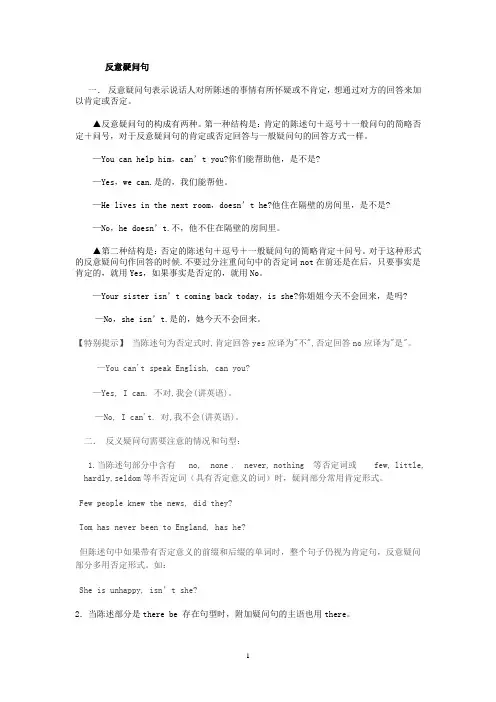
反意疑问句一.反意疑问句表示说话人对所陈述的事情有所怀疑或不肯定,想通过对方的回答来加以肯定或否定。
▲反意疑问句的构成有两种。
第一种结构是:肯定的陈述句+逗号+一般问句的简略否定+问号,对于反意疑问句的肯定或否定回答与一般疑问句的回答方式一样。
—You can help him,can’t you?你们能帮助他,是不是?—Yes,we can.是的,我们能帮他。
—He lives in the next room,doesn’t he?他住在隔壁的房间里,是不是?—No,he doesn’t.不,他不住在隔壁的房间里。
▲第二种结构是:否定的陈述句+逗号+一般疑问句的简略肯定+问号。
对于这种形式的反意疑问句作回答的时候.不要过分注重问句中的否定词not在前还是在后,只要事实是肯定的,就用Yes,如果事实是否定的,就用No。
—Your sister isn’t coming back today,is she?你姐姐今天不会回来,是吗?—No,she isn’t.是的,她今天不会回来。
【特别提示】当陈述句为否定式时,肯定回答yes应译为"不",否定回答no应译为"是"。
—You can't speak English, can you?—Yes, I can. 不对,我会(讲英语)。
—No, I can't. 对,我不会(讲英语)。
二.反义疑问句需要注意的情况和句型:1.当陈述句部分中含有 no, none , never, nothing 等否定词或 few, little, hardly,seldom等半否定词(具有否定意义的词)时,疑问部分常用肯定形式。
Few people knew the news, did they?Tom has never been to England, has he?但陈述句中如果带有否定意义的前缀和后缀的单词时,整个句子仍视为肯定句,反意疑问部分多用否定形式。
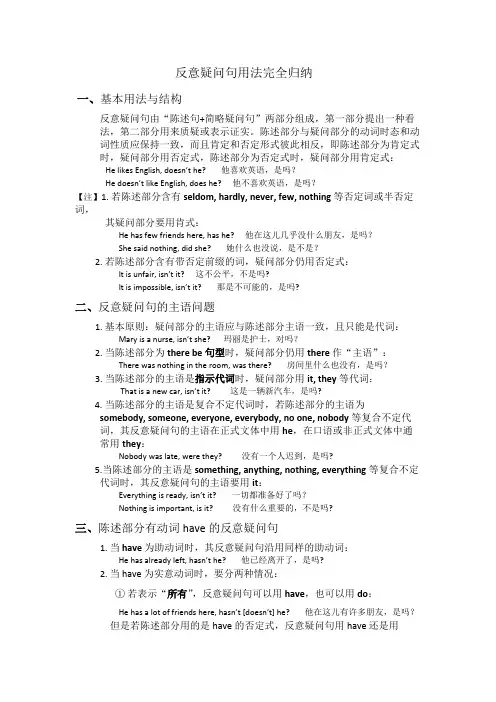
反意疑问句用法完全归纳一、基本用法与结构反意疑问句由“陈述句+简略疑问句”两部分组成,第一部分提出一种看法,第二部分用来质疑或表示证实。
陈述部分与疑问部分的动词时态和动词性质应保持一致,而且肯定和否定形式彼此相反,即陈述部分为肯定式时,疑问部分用否定式,陈述部分为否定式时,疑问部分用肯定式:He likes English, doesn’t he? 他喜欢英语,是吗?He doesn’t like English, does he? 他不喜欢英语,是吗?【注】1. 若陈述部分含有seldom, hardly, never, few, nothing等否定词或半否定词,其疑问部分要用肯式:He has few friends here, has he? 他在这儿几乎没什么朋友,是吗?She said nothing, did she? 她什么也没说,是不是?2. 若陈述部分含有带否定前缀的词,疑问部分仍用否定式:It is unfair, isn’t it? 这不公平,不是吗?It is impossible, isn’t it? 那是不可能的,是吗?二、反意疑问句的主语问题1. 基本原则:疑问部分的主语应与陈述部分主语一致,且只能是代词:Mary is a nurse, isn’t she? 玛丽是护士,对吗?2. 当陈述部分为there be句型时,疑问部分仍用there作“主语”:There was nothing in the room, was there? 房间里什么也没有,是吗?3. 当陈述部分的主语是指示代词时,疑问部分用it, they等代词:That is a new car, isn’t it? 这是一辆新汽车,是吗?4. 当陈述部分的主语是复合不定代词时,若陈述部分的主语为somebody, someone, everyone, everybody, no one, nobody等复合不定代词,其反意疑问句的主语在正式文体中用he,在口语或非正式文体中通常用they:Nobody was late, were they? 没有一个人迟到,是吗?5.当陈述部分的主语是 something, anything, nothing, everything等复合不定代词时,其反意疑问句的主语要用it:Everything is ready, isn’t it? 一切都准备好了吗?Nothing is important, is it? 没有什么重要的,不是吗?三、陈述部分有动词have的反意疑问句1. 当have 为助动词时,其反意疑问句沿用同样的助动词:He has already left, hasn’t he? 他已经离开了,是吗?2. 当 have 为实意动词时,要分两种情况:①若表示“所有”,反意疑问句可以用have,也可以用do:He has a lot of friends here, hasn’t [doesn’t] he? 他在这儿有许多朋友,是吗?但是若陈述部分用的是have的否定式,反意疑问句用have 还是用do,取决于陈述部分的动词形式:He hasn’t any money, has he? 他没有钱,是吗?He doesn’t have any money, does he? 他没有钱,是吗?②若表示“吃”、“玩”等意思,反意疑问句要用do:He has supper at 5, doesn’t he? 他5点吃晚餐,是吗?He had a good time at the party, didn’t he? 他在晚会上玩得很开心,是吗?3. 当用于have to时,通常也有两种可能:若表示经常性的行为,则多用加助动词do的形式;若表示特定的行为,则多用have:He often has to get up early, doesn’t he? 他经常要早起,是吗?He has to go to bed late tonight, hasn’t he? 他今晚要迟睡,是吗?四、含情态动词的反意疑问句1. 基本原则:在通常情况下,当陈述部分含有情态动词时,疑问部分会重复前面同样的情态动词:He can speak English, can’t he?他会说英语,是吗?We shouldn’t go, should we? 我们不应该去,对不对?2. 当陈述部分含有must时,要分两种情况:①若must表示“必须”或“有必要”,疑问部分用mustn’t或needn’t:You must leave at once, mustn’t [needn’t] you? 你必须(有必要)马上离开,是吗?但是若陈述部分有mustn’t表示禁止,疑问部分要must:You mustn’t laugh, must you? 你不准笑,知道吗?②若must表示推测,疑问部分不能用must,而应根据must后的动词结构采用相应的动词形式:He must be tired, isn’t he? 他一定累了,是吗?五、陈述部分为祈使句的反意疑问句1. 基本原则:若陈述部分为祈使句,疑问部分通常用will you:Please help us, will you? 请帮帮我们,好吗?Come with us, will you? 同我们一起去,好吗?Don’t forget to post the letter, will you? 请别忘了寄信。

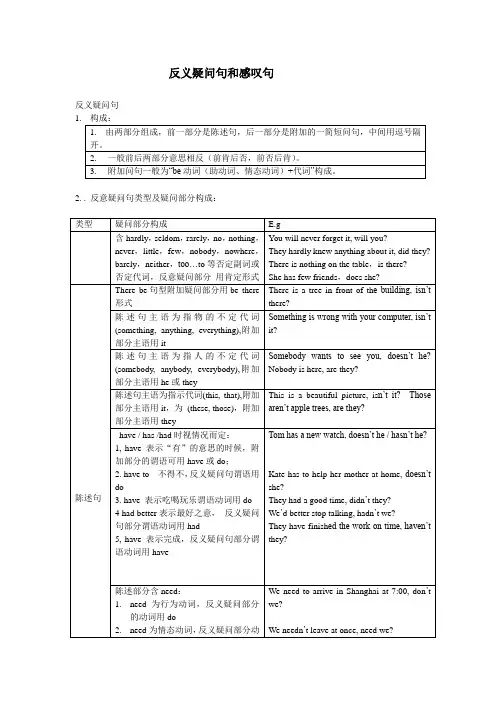
反义疑问句和感叹句 反义疑问句 1. 构成: 1. 由两部分组成,前一部分是陈述句,后一部分是附加的一简短问句,中间用逗号隔开。 2. 一般前后两部分意思相反(前肯后否,前否后肯)。 3. 附加问句一般为“be动词(助动词、情态动词)+代词”构成。
2. . 反意疑问句类型及疑问部分构成: 类型 疑问部分构成 E.g 含hardly,seldom,rarely,no,nothing,never,little,few,nobody,nowhere,barely,neither,too…to等否定副词或否定代词,反意疑问部分 用肯定形式 You will never forget it, will you? They hardly knew anything about it, did they? There is nothing on the table,is there? She has few friends,does she?
陈述句 There be句型附加疑问部分用be there形式 There is a tree in front of the building, isn’t
there? 陈述句主语为指物的不定代词(something, anything, everything),附加部分主语用it
Something is wrong with your computer, isn’t it?
陈述句主语为指人的不定代词(somebody, anybody, everybody),附加部分主语用he或they
Somebody wants to see you, doesn’t he? Nobody is here, are they?
陈述句主语为指示代词(this, that),附加部分主语用it,为 (these, those),附加部分主语用they
This is a beautiful picture, isn’t it? Those aren’t apple trees, are they?
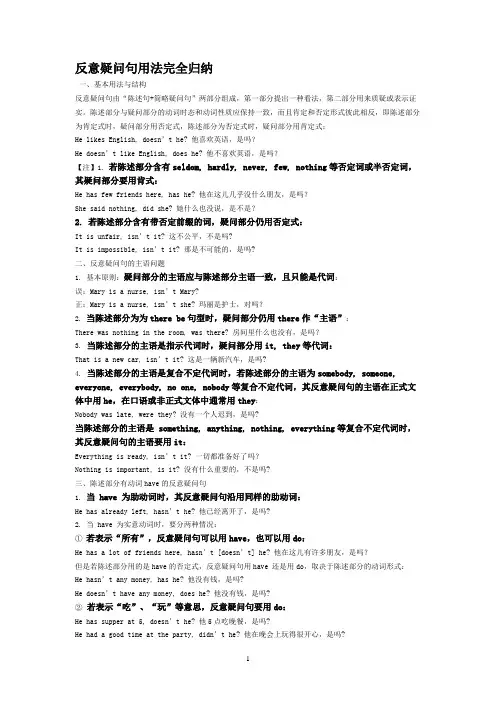
反意疑问句用法完全归纳一、基本用法与结构反意疑问句由“陈述句+简略疑问句”两部分组成,第一部分提出一种看法,第二部分用来质疑或表示证实。
陈述部分与疑问部分的动词时态和动词性质应保持一致,而且肯定和否定形式彼此相反,即陈述部分为肯定式时,疑问部分用否定式,陈述部分为否定式时,疑问部分用肯定式:He likes English, doesn’t he? 他喜欢英语,是吗?He doesn’t like English, does he? 他不喜欢英语,是吗?【注】1. 若陈述部分含有seldom, hardly, never, few, nothing等否定词或半否定词,其疑问部分要用肯式:He has few friends here, has he? 他在这儿几乎没什么朋友,是吗?She said nothing, did she? 她什么也没说,是不是?2. 若陈述部分含有带否定前缀的词,疑问部分仍用否定式:It is unfair, isn’t it? 这不公平,不是吗?It is impossible, isn’t it? 那是不可能的,是吗?二、反意疑问句的主语问题1. 基本原则:疑问部分的主语应与陈述部分主语一致,且只能是代词:误:Mary is a nurse, isn’t Mary?正:Mary is a nurse, isn’t she? 玛丽是护士,对吗?2. 当陈述部分为为there be句型时,疑问部分仍用there作“主语”:There was nothing in the room, was there? 房间里什么也没有,是吗?3.当陈述部分的主语是指示代词时,疑问部分用it, they等代词:That is a new car, isn’t it? 这是一辆新汽车,是吗?4.当陈述部分的主语是复合不定代词时,若陈述部分的主语为somebody, someone, everyone, everybody, no one, nobody等复合不定代词,其反意疑问句的主语在正式文体中用he,在口语或非正式文体中通常用they:Nobody was late, were they? 没有一个人迟到,是吗?当陈述部分的主语是 something, anything, nothing, everything等复合不定代词时,其反意疑问句的主语要用it:Everything is ready, isn’t it? 一切都准备好了吗?Nothing is important, is it? 没有什么重要的,不是吗?三、陈述部分有动词have的反意疑问句1. 当 have 为助动词时,其反意疑问句沿用同样的助动词:He has already left, hasn’t he? 他已经离开了,是吗?2. 当 have 为实意动词时,要分两种情况:①若表示“所有”,反意疑问句可以用have,也可以用do:He has a lot of fri ends here, hasn’t [doesn’t] he? 他在这儿有许多朋友,是吗?但是若陈述部分用的是have的否定式,反意疑问句用have 还是用do,取决于陈述部分的动词形式:He hasn’t any money, has he? 他没有钱,是吗?He doesn’t have any money, does he? 他没有钱,是吗?②若表示“吃”、“玩”等意思,反意疑问句要用do:He has supper at 5, doesn’t he? 他5点吃晚餐,是吗?He had a good time at the party, didn’t he? 他在晚会上玩得很开心,是吗?3. 当用于have to时,通常也有两种可能:若表示经常性的行为,则多用加助动词do的形式;若表示特定的行为,则多用have:He often has to get up early, doesn’t he? 他经常要早起,是吗?He has to go to bed late tonight, hasn’t he? 他今晚要迟睡,是吗?四、含情态动词的反意疑问句1. 基本原则:在通常情况下,当陈述部分含有情态动词时,疑问部分会重复前面同样的情态动词:He can speak English, can’t he?他会说英语,是吗?We shouldn’t go, should we? 我们不应该去,对不对?2. 当陈述部分含有must时,要分两种情况:①若must表示“必须”或“有必要”,疑问部分用mustn’t 或needn’t:You must leave at once, mustn’t [needn’t] you? 你必须(有必要)马上离开,是吗?但是若陈述部分有mustn’t表示禁止,疑问部分要must:You mustn’t laugh, must you? 你不准笑,知道吗?②若must表示推测,疑问部分不能用must,而应根据must后的动词结构采用相应的动词形式:He must be tired, isn’t he? 他一定累了,是吗?五、陈述部分为祈使句的反意疑问句1. 基本原则:若陈述部分为祈使句,疑问部分通常用will you:Please help us, will you? 请帮帮我们,好吗?Come with us, will you? 同我们一起去,好吗?Don’t forget to post the letter, will you? 请别忘了寄信。
![英语反义疑问句的问句与回答归纳[1]](https://uimg.taocdn.com/1512d980ddccda38366baf17.webp)
(完整word版)英语反义疑问句的问句与回答归纳(word版可编辑修改) 编辑整理:尊敬的读者朋友们:这里是精品文档编辑中心,本文档内容是由我和我的同事精心编辑整理后发布的,发布之前我们对文中内容进行仔细校对,但是难免会有疏漏的地方,但是任然希望((完整word版)英语反义疑问句的问句与回答归纳(word版可编辑修改))的内容能够给您的工作和学习带来便利。
同时也真诚的希望收到您的建议和反馈,这将是我们进步的源泉,前进的动力。
本文可编辑可修改,如果觉得对您有帮助请收藏以便随时查阅,最后祝您生活愉快业绩进步,以下为(完整word版)英语反义疑问句的问句与回答归纳(word版可编辑修改)的全部内容。
英语反义疑问句用法讲解一、基本概念及结构:反义疑问句又叫附加疑问句,是指当提问的人对前面所叙述的事实不敢肯定,而需要向对方加以证实时所提出的问句。
其结构为:前一部分是一个陈述句,后一部分是一个简短的问句。
完成后一部分简短问句时,要根据前面陈述句的动词时态和人称来选择适当的助动词进行提问,前后两部分的人称和动词时态要保持一致。
如果前一部分用肯定式,后一部分一般用否定式;反之,前一部分为否定式,后一部分要用肯定式,即“前肯定后否定,前否定后肯定”.例如:You don't like rock music, do you? 你不喜欢摇滚乐,对吧?二、反义疑问句的回答不管是前否后肯,还是前肯后否形式的反义疑问句,回答都根据事实回答,肯定的答案就用yes+肯定结构,否定的答案就用no+否定结构,答案要和实际情况相符。
也叫实事求是例如:1、——She is good at English, isn’t she?-—Yes, she is. 是的,她擅长或者No, she isn't.不,她不擅长2、—-There isn't a computer in your room, is there?“你的房间里没有电脑,对吗?—- Yes, there is。
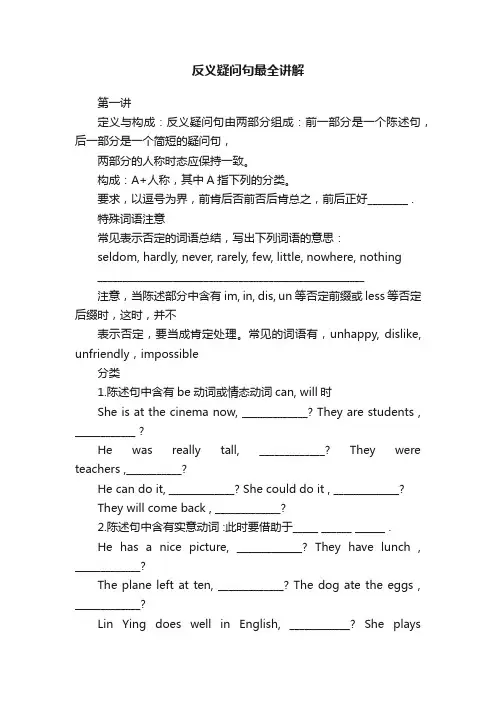
反义疑问句最全讲解第一讲定义与构成:反义疑问句由两部分组成:前一部分是一个陈述句,后一部分是一个简短的疑问句,两部分的人称时态应保持一致。
构成:A+人称,其中A指下列的分类。
要求,以逗号为界,前肯后否前否后肯总之,前后正好________ .特殊词语注意常见表示否定的词语总结,写出下列词语的意思:seldom, hardly, never, rarely, few, little, nowhere, nothing_____________________________________________________注意,当陈述部分中含有im, in, dis, un等否定前缀或less等否定后缀时,这时,并不表示否定,要当成肯定处理。
常见的词语有,unhappy, dislike, unfriendly,impossible分类1.陈述句中含有be动词或情态动词can, will时She is at the cinema now, _____________? They are students , ____________ ?He was really tall, _____________? They were teachers ,___________?He can do it, _____________? She could do it , _____________?They will come back , _____________?2.陈述句中含有实意动词 :此时要借助于_____ ______ ______ .He has a nice picture, _____________? They have lunch , _____________?The plane left at ten, _____________? The dog ate the eggs , _____________?Lin Ying does well in English, ____________? She playsbasketball, _____________?3.陈述句是there be 句型,构成为 _____________There is a ball in his hand, __________? There is little ink in the pen, __________?There are ten boys here, _________? There was a book on the desk, ___________?There were three boys palying football here ,__________?4.不定代词做陈述句主语,常用的不定代词表示人的有: everybody, everyone, someone, no one, nobody, somebody表示物的有:everything, anything, nothing, something当主语是表示人的不定代词时,反义疑问句部分的主语用_______ ,有时候也用he .当主语是表示物的不定代词时,反义疑问句部分的主语用_______ .Everything is ready, _______? Somebody borrowed my pen yesterday,_____?Somebody came here just now, ________? Nothing is wrong with the machine, ________?Nobody is waiting for you, _____________? Everything is OK, ______________?5.指示代词做陈述句主语单数this/ that _____________复数these/ those _____________These aren’t your b ook, _____________?This is a lovely city, _____________?练习1:变反义疑问句1.The boys are swimming in the river, _______?2.Mike can’t play the piano, _____________?3.The girl usually gets up early in the morning, _______?4.He wasn’t born in Wuhan, _____________?6.Jean and Kate are never late for school, __________?7.This is your bike, _____________?8.Those are American apples, _____________?9.He had to stay at home last Sunday, ________?10.You bought a new computer last week, ____?11.He hardly ever goes shopping, __________?12.The visitors are from the USA, ___________?13.Jim doesn’t like oranges, _____________?14.His mother went to work at half past seven this morning, ___________?15.They can’t mend the computer, __________?16.You are unhappy, ___________?17.They have never been to France, __________ ?18.She was watching TV at that time, _________?19.Bill enjoys ice skating very much, _________________?20.Their prices are really low, ___________?21.They won’t come back in a week, _________________?22.The pen is yours, _________23.Lucy likes English, ___________?24.That wasn’t a wonderful night, ______________?25.Your sister helped him, ______________?26.Tony is talking to his mother, ____________?27.Your brother can’t swim, _______________?28.We have to finish it before the teacher come back, _____?29.The workers had to take the first bus, ____________?30.The boys are swimming in the river, ______?31.Mike can’t play the piano, _____________?32.The girl usually gets up early in the morning, _______?33.He wasn’t born in Wuhan, _____________?35.Jean and Kate are never late for school, __________?36.This is your bike, _____________?37.Those are American apples, _____________?38.He had to stay at home last Sunday, ________?39.You bought a new computer last week, ____?40.He hardly ever goes shopping, __________?42.Jim doesn’t like oranges, _____________?43.His mother went to work at half past seven this morning, ___________?44.They can’t mend the computer, __________?45.You are unhappy, ___________?46.They have never been to France, __________ ?47.She was watching TV at that time, _________?练习2:选择1. Everything seems all right, _____ ?A. does itB. don’t theyC. won’t itD. doesn’t it2. He has never ridden a horse before, ___?A. does heB. has heC. hasn’t heD. doesn’t he3. Linda ate nothing this morning, ___?A. didn’t sheB. was sheC. did sheD. wasn’t she4. They cut the trees , _____?(A) don't they (B) didn't they (C) did they (D) do they5. His sister had a bad cough, ________ she?(A) wasn't (B) doesn't (C) hadn't ( D) didn't6. John can hardly understand any Chinese, _______ he?(A) can't (B) doesn't (C) can (D) does7. They could hardly believe the news, _____?A. couldn’t theyB. could theyC. did theyD. didn’t they第二讲6.祈使句一:一个特殊情况Let’s →shall we ? 其余都用______ ?不论肯定与否定。
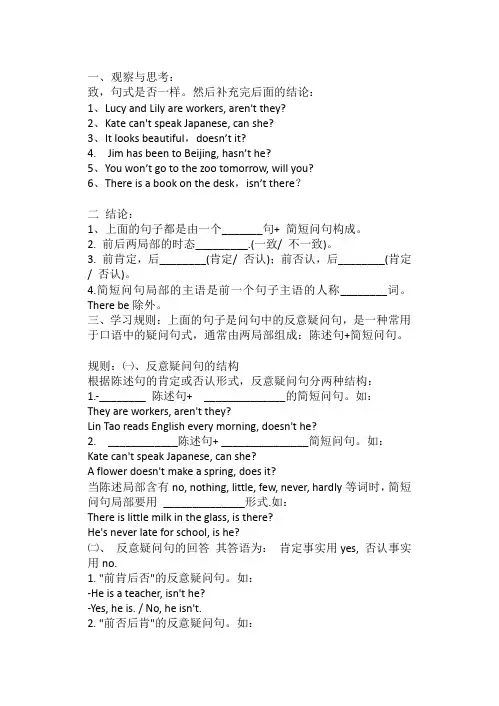
一、观察与思考:致,句式是否一样。
然后补充完后面的结论:1、Lucy and Lily are workers, aren't they?2、Kate can't speak Japanese, can she?3、It looks beautiful,doesn’t it?4. Jim has been to Beijing, hasn’t he?5、You won’t go to the zoo tomorrow, will you?6、There is a book on the desk,isn’t there?二结论:1、上面的句子都是由一个_______句+ 简短问句构成。
2. 前后两局部的时态_________.(一致/ 不一致)。
3. 前肯定,后________(肯定/ 否认);前否认,后________(肯定/ 否认)。
4.简短问句局部的主语是前一个句子主语的人称________词。
There be除外。
三、学习规则:上面的句子是问句中的反意疑问句,是一种常用于口语中的疑问句式,通常由两局部组成:陈述句+简短问句。
规则:㈠、反意疑问句的结构根据陈述句的肯定或否认形式,反意疑问句分两种结构:1.-________ 陈述句+ ______________的简短问句。
如:They are workers, aren't they?Lin Tao reads English every morning, doesn't he?2. ____________陈述句+ _______________简短问句。
如:Kate can't speak Japanese, can she?A flower doesn't make a spring, does it?当陈述局部含有no, nothing, little, few, never, hardly等词时,简短问句局部要用______________形式.如:There is little milk in the glass, is there?He's never late for school, is he?㈡、反意疑问句的回答其答语为:肯定事实用yes, 否认事实用no.1. "前肯后否"的反意疑问句。
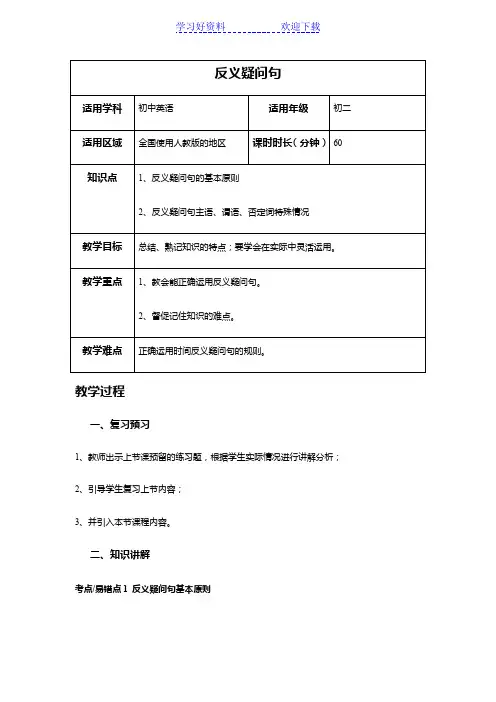
教学过程一、复习预习1、教师出示上节课预留的练习题,根据学生实际情况进行讲解分析;2、引导学生复习上节内容;3、并引入本节课程内容。
二、知识讲解考点/易错点1 反义疑问句基本原则1、遵循“前否后肯”或“前肯后否”的原则:Jim isn’t in Class Four, is he?2、前后两句主语相同:Mr Zhang has been here for four years, hasn’t he? 考点/易错点2 主语选用的特殊情况考点/易错点3 谓语选用特殊情况考点/易错点4 否定词的特殊情况句中有seldom, hardly, no, not, never, few, little, nothing, nobody, nowhere等是否定句,疑问部分必须采用肯定形式:Nobody phoned while I was out, did they?He is hardly able to swim, is he?There is little ink in your pen, is there?三、例题精析【1】I am right , ____________ ?答案:aren’t I【2】They can hardly believe it,________ ___________ ?答案:can they,他们很难相信(这件事),是吗?【3】Give me some money, _________ ____________?答案:will you,给我一些钱,好吗?四、课堂运用【基础】一、填空1.It’s very hot today, _______________ ?2. He can speak Chinese, _______________ ?3. Meimei studies in a middle school, _______________ ?4. He never gets up late , _______________ ?5. Don’t go out at night, _______________ ?【巩固】二、填空1.Everything starts to grow in spring, _______________ ?2.He can hardly finish his homework, _______________ ?3.I’m in Class 3,Grade 2, _______________ ?4.Let’s go shopping , _______________ ?5.She doesn’t like climbing hills , _______________ ?【拔高】三、单项选择1. Linda ate nothing this morning, ___?A. didn’t sheB. was sheC. did sheD. wasn’t she2. There’s hardly___ milk in the bottle, _____there?A. no, isn’tB. some, isC. little, isn’tD. any, is3. He has never ridden a horse before, ___?A. does heB. has heC. hasn’t heD. doesn’t he4. — He seldom came here, _____?— Yes sir.A. didn’t heB. does heC. doesn’t heD. d id he5. Everything seems all right, _____ ?A. does itB. don’t theyC. won’t itD. doesn’t it7. One can’t be too modest, can _____ ?A. oneB. heC. itD. we8. No one failed in the exam, _____ ?A. was heB. did oneC. did theyD. didn’t he10. Neither you nor I am a artist, _____ ?A. am IB. aren’t weC. are weD. amn’t I答案:一、1 . isn’t it 2. can’t he 3.doesn’t she 4.does he 5.will you二、1.doesn’t it 2.can he 3 .aren’t I 4.shall we 5.does she三、1—5 CDBDD 6—10 BACDC课程小结这节课我们主要学习了反义疑问句相关知识。
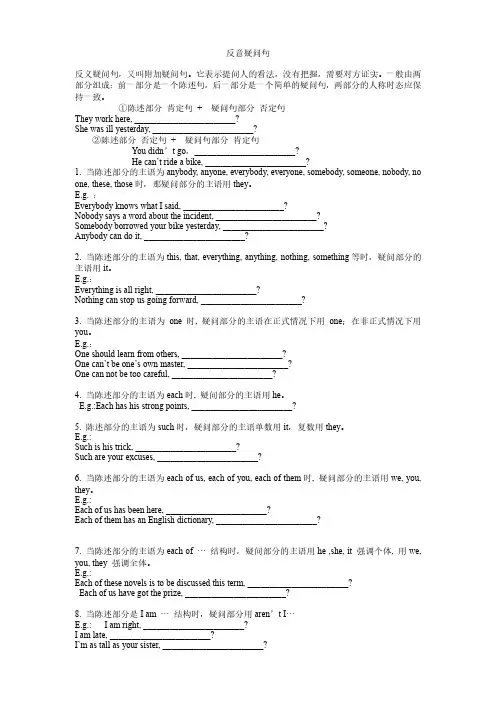
反意疑问句反义疑问句,又叫附加疑问句。
它表示提问人的看法,没有把握,需要对方证实。
一般由两部分组成:前一部分是一个陈述句,后一部分是一个简单的疑问句,两部分的人称时态应保持一致。
①陈述部分肯定句+ 疑问句部分否定句They work here, _______________________?She was ill yesterday, _______________________?②陈述部分否定句+ 疑问句部分肯定句You didn’t go,_______________________?He can’t ride a bike, _______________________?1. 当陈述部分的主语为anybody, anyone, everybody, everyone, somebody, someone, nobody, no one, these, those时,那疑问部分的主语用they。
E.g. :Everybody knows what I said, _______________________?Nobody says a word about the incident, _______________________?Somebody borrowed your bike yesterday, _______________________?Anybody can do it, _______________________?2. 当陈述部分的主语为this, that, everything, anything, nothing, something等时,疑问部分的主语用it。
E.g.:Everything is all right, _______________________?Nothing can stop us going forward, _______________________?3. 当陈述部分的主语为one时, 疑问部分的主语在正式情况下用one;在非正式情况下用you。
反义疑问句1.定义:反义疑问句(The Disjunctive Question 或Question tags) 即附加疑问句。
它表示提问人的看法,没有把握,需要对方证实。
反义疑问句由两部分组成:前一部分是一个陈述句,后一部分是一个简短的疑问句,两部分的人称时态应保持一致。
这类反义疑问句有时带有感情色彩,表示惊奇,愤怒,讽刺,不服气等。
例如:You call this a day's work,don't you?你说这就叫一天的活儿,不是吗?2.句子结构1.陈述部分肯定句+疑问部分否定句(可记为前肯后否)。
例:They work hard, don’t they? 他们努力工作,不是吗?Let's go to the supermarket ,shall we?让我们去超市,好吗?2.陈述部分否定句+疑问部分肯定句(可记为前否后肯)。
例:You didn't go, did you?你没去,是吗?3.否定意义的词(1)当陈述部分有never,seldom, hardly,few,little, nothing,none,no, not, no one, nobody, neither等否定意义的词汇时,后面的反意疑问句则为肯定形式:There're few apples in the basket, are there?He can hardly swim, can he?They seldom come late, do they?(2)当陈述部分的主语为everyone,someone,anyone,no one等表示人的不定代词时,疑问部分的主语用they或he:Everyone in your family is a teacher, aren’t they\isn't he?(3)当陈述部分的主语为everything,something,anything.nothing等表示物的不定代词时,疑问部分的主语用it:Something is wrong with your watch, isn’t it?(4)当陈述部分含有否定意思的词是unhappy,dislike,unfriendly,等含有否定词缀的派生词,也就是有un,dis-前缀、-less后缀等含词缀而意思否定的词,当肯定句处理,疑问部分用否定形式。
1 小学英语反意疑问句教案 一、教学目标:1、学会反意疑问句的基本结构及其基本用法; 2、能用反意疑问句表达生活中的常用问题。 二、教学重点:反意疑问句的结构 教学难点:反意疑问句的各种特殊变化及其运用 三、教具:图片 四、教学过程: ㈠复习: ⒈复习陈述句的肯定形式和否定形式——陈述句的故事 陈述句是用来叙述一个事实。其特点是句末用句号".",朗读时通常用降调"↘"。陈述句家族中有"两兄弟":大哥是肯定句,小弟是否定句。
老大肯定句,对人对事都持有肯定的态度,常说的四句话是: (1)I am Tom .我是汤姆。[系动词be型] (2)I have an apple.我有一个苹果。[have/has(有)动词型] (3)I like playing football.我喜欢踢足球。[实义动词型] (4)I can cook the meals.我会做菜。[情态动词型]
小弟否定句,对人对事总是持有否定的态度,和大哥肯定句唱反调。因此小弟常把大哥的话加上"不"字,不信,请听: (1)I am not Tom.我不是汤姆。 (2)I have not an apple.我没有苹果。 (3)I don't like playing football.我不喜欢踢足球。 (4)I can't cook the meals.我不会做菜.
Be动词的否定形式 肯定形式 否定形式 缩写形式 am am not \ is is not isn’t 2
are are not aren’t 行为动词的否定形式 do—— do not —— don’t
⒉复习疑问句: 一般疑问句和特殊疑问句 —— 十万个为什么的故事 疑问句有两姐妹,她们非常喜欢问问题。 大姐特殊疑问句比较聪明,知道很多常识,因此她问的问题比较特殊,常常加上特殊疑问词,what ,when ,why ,who ,where ,how....... 她喜欢说这些话: When do they have lunch? 他们什么时候吃饭? Where does he do his homework? 他在那里做作业? How is your father? 你爸爸怎么样了? 二妹一般疑问句比较笨,一般的问题都不知道,所以常常问这些问题: Is this an apple? [be 型] Are you Lucy? Do you go to school by bus ?[助动词型] 后来,疑问句家庭又生了个小妹妹,你记得她是谁吗?她叫做“反意疑问句”。下面我们一起来重新认识下她!
2、反意疑问句的定义——“反意疑问句就是我,我就是反意疑问句” 我是谁呢? 反义疑问句又叫做附加疑问句,是指当提问的人对前面所叙述的事实不敢肯定,需要想对方以及证实时所提出的问句。它是疑问句的一种,常用来征求对方的看法,形式上是一个省略问句,附加在陈述句后,两部分的人称时态应保持一致。 简单地说,我就是个“半懂半不懂的问题孩子”(肯定一半,否定一半)。 Eg.She is a lovely girl ,isn’t she? She isn’t a lovely girl,is she? He will go home, won’t he? He won’t go home,will he ? 想一想,你发现什么规律了? 3
3、反意疑问句的结构——“前肯后否,前否后肯” 1.肯定式陈述部分+否定式疑问部分 They work hare, don’t they? She was ill yesterday, wasn’t she? 2.否定式陈述部分+肯定式疑问部分 You didn’t go, did you? He can’t ride a bike, can he? 注意动词前后保持一致,人称不变。 ★总结1:前肯后否,前否后肯,前陈后疑。 练一练: (1)He often goes to work by bus, ________________? (2)Uncle Wand can make different kinds of kites, _________________? (3)Peter wasn’t late for school this morning, ____________________? (4)They were at home last night, ___________________? (5)His aunt bought a new car, __________________? (6)Mr. Li didn’t have a meeting last week, __________________?
注意:当主语为名词,人名时,反义疑问句的主语必须用人称代词来代替。 Your brother’s gone to the library, hasn’t he ? Mary is working hard, isn’t she ? ★总结2:Be、助、情,直接加人称:陈述句中如果有Be动词、助动词、情态动词时,疑问部分就由这些词加上主语人称代词; ★总结3:三变三,过变过:如果陈述句动词是第三人称单数(-s)时,疑问部分就由does\doesn’t+人称代词;如果陈述句动词是一般过去式,疑问部分就did\didn’t+人称代词. ★反意疑问句常见的八种特殊情况—— 我有八个变身哦! 1、陈述句为there be+主语+其他结构时,反义疑问句部分要用“be(not)+there”结构 There are some bananas in the basket, aren’t there? 练一练:(图片展示,one by one造句) 4
2、表示否定意义的词:
Little few never hardly seldom nobody nothing scarcely 当陈述句有表示否定意义的词时,疑问部分用肯定式。 Eg:She never tells a lie,does she? He was seldom late,was he? 3、陈述句中含有un-, im-, in-, dis-等词缀构成的否定词语时,陈述部分视为肯定,反义疑问句要用否定形式。 Your father is unhappy, isn’t he? It is impossible to learn English without remembering more words, isn’t it? The man is dishonest, isn’t he? 练一练:(图片展示,one by one造句) 4、陈述部分是祈使句时,疑问部分用will you。如: Don't be late next time, will you? 下次不要迟到了,好吗? Come here, will you / won't you? 到这儿来,好吗? 注意: Let's 开头的祈使句,疑问部分用shall we, Let us 开头的祈使句,疑问部分用will you。 如: Let's start with the song, shall we? 咱们以这首歌开始,好吗?
Let us help you, will you? 让我帮助你,好吗? 练一练: (1)Don’t read in the sun ,_____________? (2)Drink some water ,____________________? (3)Let us go,____________________ ? (4)Let’t go,____________________ ? 5、have作为“有”的意思时,反义疑问部分可以用have或是do的相对应形式 You have a sister, do /have you? You don’t have an English dictionary, do you? 5
She hasn’t a pen, has she? 练一练:口头练习 6、部分的主语是I,疑问部分要用 aren't I. I'm as tall as your sister,aren't I?
7、陈述部分的谓语是wish,疑问部分要用may +主语。 I wish to have a word with you, may I? 8、陈述句主语为this, that,反义疑问句用it代替,陈述句主语为these和those时,
翻译疑问句用they代替 That isn’t a useful book,is it? Here are important reading books, aren’t they? 实战练习: 1. Tom was happy, _________________? 2. Tom was unhappy, _________________? 3. Tom wasn’t happy, _________________? 4. Tome likes watching TV, _________________? 5. Tom dislikes watching TV, _________________? 6. Tome doesn’t like watching TV, _________________? 7. There are some birds singing in the tree, _________________? 8. It seldom rains in Shenzhen, _________________? 9. Cathy has little money, _________________? 10. Christine hardly gets up early, _________________? 11. Open the door, _________________? 12. Don’t close the door, _________________? 13. Let’s go to the supermarket, _________________? 14. Let us go to the supermarket, _________________? 15. They had lunch together, _________________? 16. Jim is ill. Let’s go and see him after school, _________________? 17. His father hardly knows English, _________________? 18. He thinks his aunt is right, _________________? 19. Linda has just come back from America, _________________? 20. You will watch TV this evening, _________________? 21. You like apples, _________________? 22. Let’s go to Hong Kong, _________________? 23. Something wrong has happed, _________________? 24. They study a lot, _________________? 25. Her daughter cleaned the carpets and curtains, _________________?